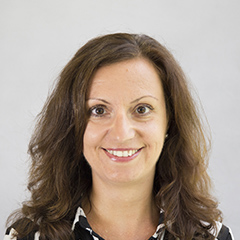Galina Lapadatova is an expert in mixed-methods evaluation with more than 15 years of experience designing and implementing large-scale program evaluations across North and West Africa, Latin America and the Caribbean, South Asia, and the United States. Her work spans sectors including education, energy, and agriculture.
At Mathematica, Lapadatova currently serves as deputy project director for an education project in Morocco funded by the Millennium Challenge Corporation, where she leads the endline data collection and analysis. The evaluation combines an impact evaluation with an in-depth qualitative study to assess efforts to improve the quality of secondary education. She also directs the implementation evaluation of the Transmission Project under the Senegal Power Compact and oversees baseline data collection and analysis for all three Senegal Power Projects (Access, Transmission, and Reform).
Since joining Mathematica in 2010, Lapadatova has led or supported evaluations of major international initiatives, including:
- Energy projects in Benin and Senegal focused on generation, distribution, access, and reform;
- Agriculture programs in Niger on irrigation, farmer training, and land reform;
- Education and workforce development efforts in Guatemala and Morocco;
- Youth assessments in Morocco and Guinea; and
- Early grade reading interventions across Latin America, the Caribbean, and South Asia.
Her research portfolio also includes a cross-country analysis of national census bureaus in Argentina, Canada, and the United Kingdom, as well as several U.S.-based evaluations in early childhood development, education, and nutrition. She served as deputy project director for the Harlem Children’s Zone longitudinal study, where she designed and piloted instruments, managed data collection, analyzed results, and presented findings to the client.
Lapadatova is a native Bulgarian speaker and fluent in French, Spanish, and Macedonian, with professional working proficiency in Russian. She holds a master’s degree in public policy from Monmouth University, a bachelor’s degree in political science from Stockton University, and a bachelor’s degree in international relations from the University of National and World Economy.


